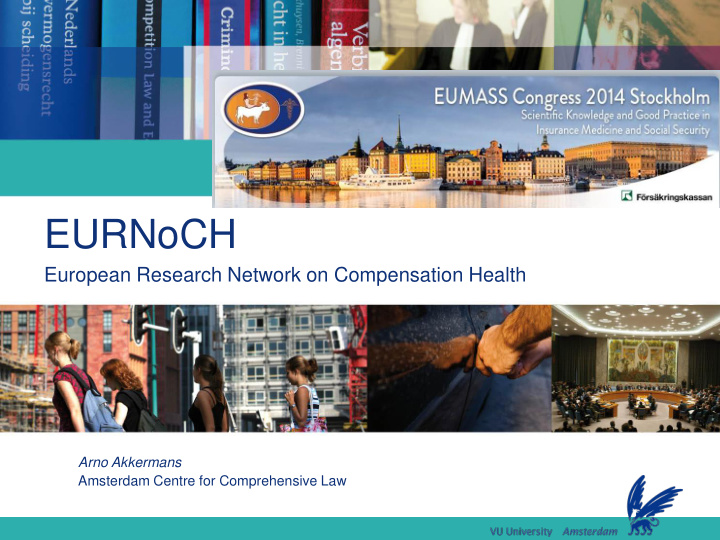



European Research Network on Compensation Health 1 EURNoCH European Research Network on Compensation Health Arno Akkermans Amsterdam Centre for Comprehensive Law
European Research Network on Compensation Health 2 Faculty Disclosure X No, nothing to disclose Yes, please specify:
European Research Network on Compensation Health 3 Compensation procedure is relevant for health Many studies have shown correlations between differences in health outcomes and particular factors of the compensation procedure in question. • Fault-based compensation vs no-fault schemes Particularly important to • lump sum payments vs intermittent payments defeat the prevailing belief that worse outcomes are an • Litigation processes vs out-of-court settlements unavoidable consequence • Lawyer engagement of financial compensation per se (‘ secondary gain ’) and • Adversarial and stressful interactions cannot be defeated by other • (Repeated) Medical assessments means than curbing eligibility
European Research Network on Compensation Health 4 Legislative change can have impact on health outcomes • Saskatchewan tort system for traffic injuries changed to no-fault system (Cassidy et al, 2000) • Legislative reforms to the New South Wales transport accident compensation scheme (Cameron et al, 2008)
European Research Network on Compensation Health 5 Operational changes within a given system can have impact on health outcomes Novel approach towards claims handling for people injured in road traffic crashes by a compulsory third party motor vehicle insurance company in New South Wales (Schaafsma et al, 2012) i.e.: • early intervention service • early psychological risk screening • facilitating early RTW • clear and direct communication • acknowledgement • proactive dispute resolution
European Research Network on Compensation Health 6 When the system is ‘good’: better health outcomes and RTW among claimant population
European Research Network on Compensation Health 7 We need better studies! • Interdisciplinary in stead of monodisciplinary research teams • More sophisticated taxonomy of variables • Data sets specifically collected for CHR purposes • Cross-jurisdictional studies
European Research Network on Compensation Health 8 Mission of EURNoCH • To provide more detailed understanding and higher quality evidence of what exactly causes the detrimental effects of compensation procedures and how they can be restrained, in order to enable informed changes in policy, case law, the modus operandi of the relevant professions and institutions, and to inspire legislative change. • Previous research studies are too limited for these purposes, because these studies had a monodisciplinary focus and hence have shortcomings on both the variety and the details of the compensation systems that are involved and the possible predictors that ensue. • Earlier datasets were not collected with the specific aim of studying compensation-related factors and therefore do not include all relevant variables.
European Research Network on Compensation Health 9 Cross jurisdictional study Elbers et al New South Wales (NSW): Fault-based scheme Victoria (VIC): Australia No-fault scheme Aim: compare procedural fairness, health & recovery NSW VIC Hypothesis: VIC > NSW
European Research Network on Compensation Health 10 Preliminary results Procedural justice Informational justice • Views/feelings were taken into account • Provided information needed • Claim was managed objectively • Explained what was going to happen • Correct information was used • Communicated at the right times 100% 100% 90% 90% 87% 80% 80% 82% 70% 70% 60% 60% 50% 50% 40% 40% 43% 40% 30% 30% 20% 20% 10% 10% 0% 0% NSW VIC NSW VIC
European Research Network on Compensation Health 11 Preliminary results Health 100% Good health prior to accident 98% 90% 92% Good health post accident 80% 70% Life back on track 67% 60% 10 50% 9 47% 8 40% 7 30% 7,05 6 20% 5,72 5 10% 4 0% 3 NSW VIC 2 1 0 NSW VIC
European Research Network on Compensation Health 12 Towards a sophisticated international CHR taxonomy
Recommend
More recommend